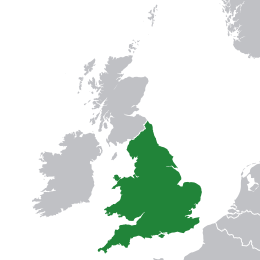Kingdom of England (927–1707): Difference between revisions
From ProleWiki, the proletarian encyclopedia
More languages
More actions
(Created) Tag: Visual edit |
No edit summary Tag: Visual edit |
||
| Line 1: | Line 1: | ||
{{Infobox country|name=Kingdom of England|image_flag=Flag of England.svg|image_coat=Medieval coat of arms of England.svg|capital=London|mode_of_production=[[Feudalism]] (10th–17th century)<br>[[Capitalism]] (17th–18th century)|government_type=Monarchy|life_span=927–1707|image_map=England and Wales.svg|map_width=260}} | {{Infobox country|name=Kingdom of England|image_flag=Flag of England.svg|image_coat=Medieval coat of arms of England.svg|capital=London|mode_of_production=[[Feudalism]] (10th–17th century)<br>[[Capitalism]] (17th–18th century)|government_type=Monarchy|life_span=927–1707|image_map=England and Wales.svg|map_width=260}} | ||
The '''Kingdom of England''' was a medieval and early modern state located on the island of Great Britain. It limited the power of feudal barons by largely relying on mercenaries rather than knights, which gave it a military advantage against [[Kingdom of France (987–1792)|France]] and other countries.<ref name=":0222">{{Citation|author=Neil Faulkner|year=2013|title=A Marxist History of the World: From Neanderthals to Neoliberals|chapter=European Feudalism|page= | The '''Kingdom of England''' was a medieval and early modern state located on the island of Great Britain. It limited the power of feudal barons by largely relying on mercenaries rather than knights, which gave it a military advantage against [[Kingdom of France (987–1792)|France]] and other countries.<ref name=":0222">{{Citation|author=Neil Faulkner|year=2013|title=A Marxist History of the World: From Neanderthals to Neoliberals|chapter=European Feudalism|page=86–88|pdf=https://cloudflare-ipfs.com/ipfs/bafykbzacedljwr5izotdclz23o3c5p4di4t3ero3ncbfytip55slhiz4otuls?filename=Neil%20Faulkner%20-%20A%20Marxist%20History%20of%20the%20World_%20From%20Neanderthals%20to%20Neoliberals-Pluto%20Press%20%282013%29.pdf|publisher=Pluto Press|isbn=9781849648639|lg=https://libgen.rs/book/index.php?md5=91CA6C708BFE15444FE27899217FBA8E}}</ref> | ||
== History == | == History == | ||
The [[Black Death]] spread to Europe in 1348 and killed a third of the total population. [[Peasantry|Peasants]] led by [[Wat Tyler]] rebelled in 1381, made an alliance with sections of the urban population, and confronted the King.<ref name=":0222" /> | The [[Black Death]] spread to Europe in 1348 and killed a third of the total population. [[Peasantry|Peasants]] led by [[Wat Tyler]] rebelled in 1381, made an alliance with sections of the urban population, and confronted the King. Following the [[Wars of the Roses]], the Tudor dynasty took power in 1485 and centralized power while strengthening Parliament and decreasing the power of the feudal lords.<ref name=":0222" /> | ||
== References == | == References == | ||
[[Category:Medieval history]] | [[Category:Medieval history]] | ||
[[Category:History of England]] | [[Category:History of England]] | ||
Revision as of 18:31, 18 January 2023
| Kingdom of England | |
|---|---|
| 927–1707 | |
 | |
| Capital | London |
| Dominant mode of production | Feudalism (10th–17th century) Capitalism (17th–18th century) |
| Government | Monarchy |
The Kingdom of England was a medieval and early modern state located on the island of Great Britain. It limited the power of feudal barons by largely relying on mercenaries rather than knights, which gave it a military advantage against France and other countries.[1]
History
The Black Death spread to Europe in 1348 and killed a third of the total population. Peasants led by Wat Tyler rebelled in 1381, made an alliance with sections of the urban population, and confronted the King. Following the Wars of the Roses, the Tudor dynasty took power in 1485 and centralized power while strengthening Parliament and decreasing the power of the feudal lords.[1]
References
- ↑ 1.0 1.1 Neil Faulkner (2013). A Marxist History of the World: From Neanderthals to Neoliberals: 'European Feudalism' (pp. 86–88). [PDF] Pluto Press. ISBN 9781849648639 [LG]


